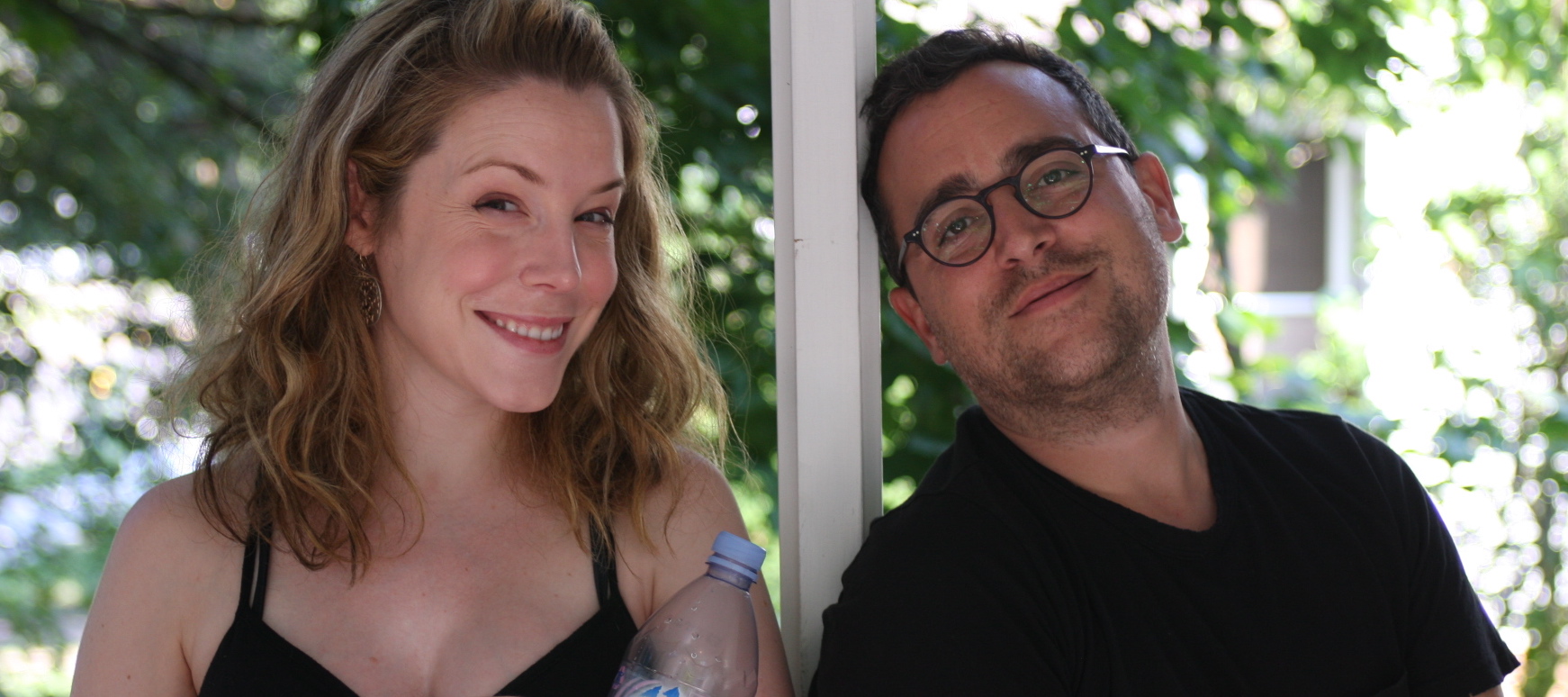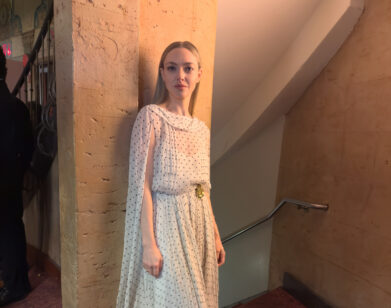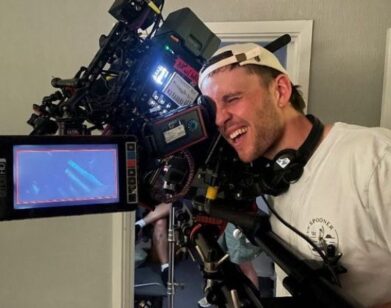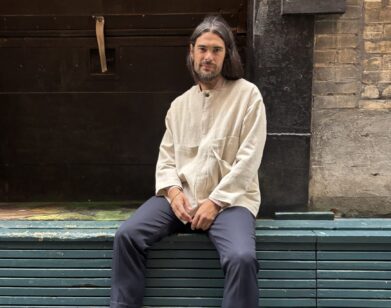Hear Him Now: Paul Marcarelli on His New Film and Ten Years as the Verizon Guy

PAUL MARCARELLI (RIGHT) WITH THE GREEN PRODUCER MOLLY PEARSON
PHOTO COURTESY OF SPENCER MONDSHEIN
Best known as the Verizon Guy, he who dares ask “Can you hear me now?” every couple of seconds as he inspects the globe for cell coverage, actor and writer Paul Marcarelli is now wearing a different hat—or different pair of eyeglasses, we should say—as screenwriter and producer for the chilling new drama The Green, about a gay high school teacher in Connecticut who is accused of inappropriate relations with one of his students.
Gregarious and stylish, Marcarelli is every bit as perky and thorough as his commercial persona; but in his non-TV life, he has more stubble, gray hairs, and is unlikely to be seen in a blue work uniform. Still, he’ll joke about showing up as the Verizon Guy at your Halloween party and will happily tell you where to get the best croissant in Williamsburg, Brooklyn, where he lives half-time.
DEENAH VOLLMER: Are “Can you hear me now?” your five least favorite words?
PAUL MARCARELLI: Listen, I’m so grateful to have had the job that I’ve had for the last 10 years that if couple of people want to ask me that question on the street, it’s a very small price to pay. I have no problem with it, believe me.
VOLLMER: So you don’t feel haunted by the catchphrase?
MARCARELLI: No, not in the least. I feel very grateful. I wasn’t raised with money. My parents were schoolteachers; I was raised on a small farm. It never dawned on me that I would have a job that someone would pay me to do. Much less a job like this. It would be ridiculous if I had any complaints about it. And look—I’ve had the opportunity to learn an entirely new set of skills, and I’m bringing them to the work I’m doing now in filmmaking.
VOLLMER: What are some of those skills?
MARCARELLI: I’ve spent hundreds of days on commercial sets in the last ten years. If I didn’t learn something along the way, I wasn’t paying very close attention. More than anything, I think the real story behind our film is that we could shoot an entire feature in 17 days. And I don’t think that would be possible if I didn’t have 10 years of experience in commercials, where you have one day to get the story told.
VOLLMER: So you don’t feel pigeonholed?
MARCARELLI: You know, I’m not worried about it. I just try to bring a kind of consciousness to the work I’m doing. I’ll worry about the next job when I have the next job. There are a lot worse things than being known for a certain kind of specificity. You’ll get calls for that thing. And that’s better than not getting any calls at all.
VOLLMER: Are you still working for Verizon?
MARCARELLI: I am. I’m in my tenth year. The contract is there, it’s very much ongoing. I just did an appearance with Jane Lynch at the Emmys. I did a commercial that appeared during the Super Bowl. I’m not traveling as much as I used to, but I’m very much under contract to them.
VOLLMER: I read the interview you had done with the Atlantic back in April. I was under the impression your contract had ended.
MARCARELLI: I did one interview with the Atlantic. It was very interesting; I could write an entire book on that one experience. I’ve never had any type of public persona outside of the face recognition I have with this job, so I was really ill prepared to have this conversation. I think the real story was that it became a source for a flurry of other derivative stories. I remember the Post headline said “Marcarelli’s Bizarre Life,” which to me is code for gay, primarily. At the end of the day, it’s just non-news becoming more non-news becoming more non-news. It just happens to be completely inaccurate.
VOLLMER: What elements did you find to be inaccurate?
MARCARELLI: I found their angle to be big, bad, company squelching the creative spirit of this little guy. And it just happens to not be the case.
VOLLMER: I read in that same interview that you had waited to come out as gay publicly until the end of your contract with Verizon. Is that true?
MARCARELLI: It’s not true. Like I said, I’ve never had any kind of public persona outside of this job. So it’s only now in going out to talk about my film and my work outside of the job that I’ve discussed my private or personal life in any way, shape, or form. With publicity, you can’t unring a bell. Whenever you create something that has a gay theme, it’s inherently political. It’s important that the intentions of the people behind the project be known. In discussing my sexual orientation, I found it to be germane to the topic of the film. It’s what made the film relatable and personal to me, but I’ve been out since I was 19. I’ve never been in the closet, so to say.
VOLLMER: Sound like there are a lot of rumors going around about you.
MARCARELLI: I think someone’s sexual orientation is great fodder for gossip. But again, it’s non-news to me or anyone who knows me.
VOLLMER: Because you’re the Verizon guy, do you find that people ask you tech-y questions?
MARCARELLI: From time to time. Before my commercial career, I never played for more than an audience of 99 seats somewhere in downtown New York, but occasionally someone would recognize me in the subway and say, “Oh, I saw you in that play, you were really great in that,” or “the director was really something.” It becomes a conversation. When people spot me on the street from my work in commercials, there’s nowhere for the conversation to go. So it goes to, “Oh, I have this question about my phone bill, can you help me with that?” Obviously I’m an actor and I can’t.
VOLLMER: I really enjoyed The Green. It’s a very dramatic film, full of surprising twists, and also a very important film. The message I took away was that just because gay marriage is legal, it doesn’t mean homophobia has gone away, and homophobia can exist under the surface even in a seemingly liberal environment.
MARCARELLI: Accusations against gay schoolteachers figure really prominently in liberal news headlines, because they’re attention-grabbing and ratings-getting. They last a news cycle and go away and then you never hear about them again. It’s impossible to find the follow-up. Nine times out of 10 in our research we found, talking to local reporters who cover these stories, they enter an acquittal or they never go anywhere. And in the meantime, lives are destroyed. We recognize that it is a rather extreme incident, one that creates the dramatic arc of the film, but we wanted to use the film to explore the larger issue of tolerance. I feel like the places where I like to live, or study, or visit are places where people’s differences are celebrated rather than just tolerated.
VOLLMER: Is the town that you live in, in Connecticut, like the town you portrayed in the film?
MARCARELLI: Well, obviously it looks the same, because that’s where we shot it. But in a lot of ways, no. I think my way into the story was much more my experience splitting my time between New York and Connecticut. My way into the story itself was a lot about my own observations about my behavior in these very different milieus. For me, there is a very unique experiences that I have discovered I share with a lot of people who have seen the film at gay film festivals this year, when you are the only gay guy on the block, you feel this responsibility to be this ambassador. You spend a lot of time making sure that other people feel comfortable with you. The perception that we project on that community, that gets in the way of a clear line of communication. In the film, I really wanted to show that a lot of what Michael perceives to be judgment or observation or the sort of paranoia that’s inherent in the story—a lot of it something that he creates. Not that homophobia doesn’t exist; of course it does. But I don’t think anyone’s totally clean in this story.
VOLLMER: You said you interviewed reporters for research. Did you interview any teachers who had been accused of inappropriate behavior?
MARCARELLI: No. But I did interview a couple of school social workers who worked on these cases. We wanted to make sure that our procedure was technically sound and correct. We talked to a couple of civil rights lawyers that handle these types of cases. I tracked a lot of these cases, so that was really what my research consisted of.
VOLLMER: What was the most surprising thing you learned from researching the story that you might not have known if you’d just written it without research?
MARCARELLI: My suspicion was validated that there is no motivation in newsrooms to follow up on these stories. Our attention span lasts through the headline.
VOLLMER: So these people are marked forever with the allegation?
MARCARELLI: Yep. And I found traveling with the film this summer too that there hasn’t been a single screening, anywhere in the country, where a teacher hasn’t come up during the Q&A or after and said, “I’m a gay teacher, and this is my worst nightmare.”
VOLLMER: As an actor, why did you decided not to act in this film?
MARCARELLI: I’ve never been able to write for myself. I was doing a lot. I produced it, I wrote it—I didn’t see myself in the world of this film. I’m sure there are elements of dark corners of my psyche that found their ways on screen; you didn’t need my mug up there. There was enough of my essence in the story as it plays out without me acting in it.
VOLLMER: The glasses you’re wearing look a little bit like the Verizon Guy’s glasses. I read that you changed to wire frame glasses, so people would stop recognizing you from commercials, but are you back to black thick-rimmed glasses?
MARCARELLI: I actually don’t have any wire-frame glasses. I rotate out. I have about 20 pairs that are in constant rotation. I change them with my mood. I don’t actually wear the glasses I wear in the commercial, ever. I wear them when I’m working.
VOLLMER: What is your next project?
MARCARELLI: We start shooting in March on a dark comedy that I wrote about a compulsive hoarder and the complicated relationship she has with her grown children.
VOLLMER: Do you have hoarding tendencies?
MARCARELLI: I have no hoarding tendencies whatsoever. I’m a purger. I am constantly throwing things out. Like everyone, I have a scary junk drawer or corner of the closet. And those little dark corners weigh on me enough to know how hard it must be to be a hoarder. And I also think that’s why these hoarding shows are so popular, because it taps into something we all feel in ourselves. We hold onto things we don’t need.
THE GREEN IS OUT TOMORROW ON VIDEO ON DEMAND AND WILL BE RELEASED ON DVD NOVEMBER 22.






